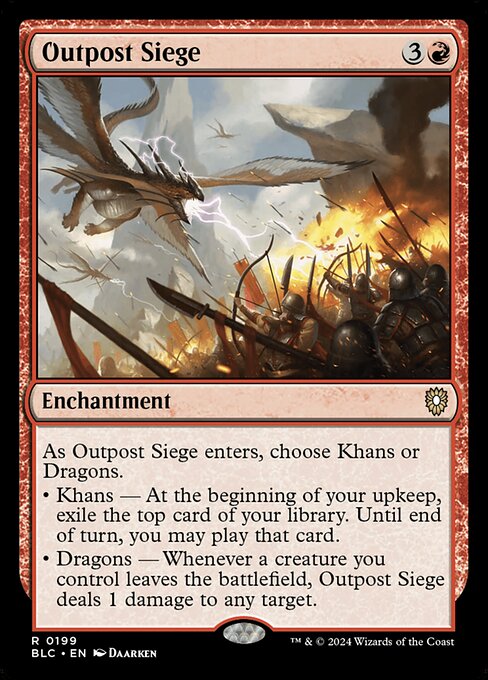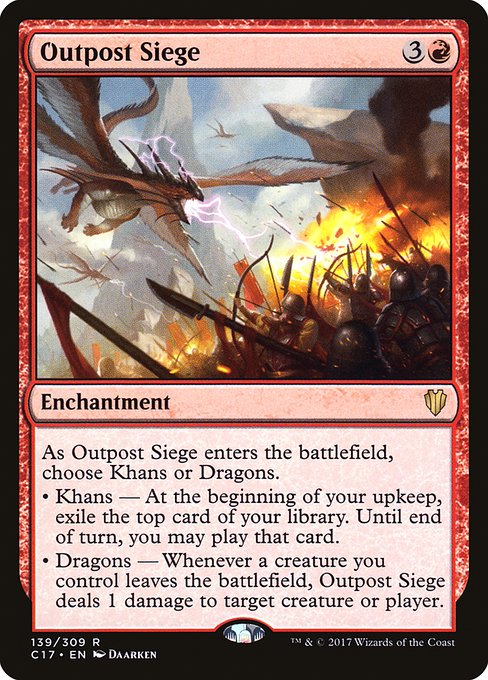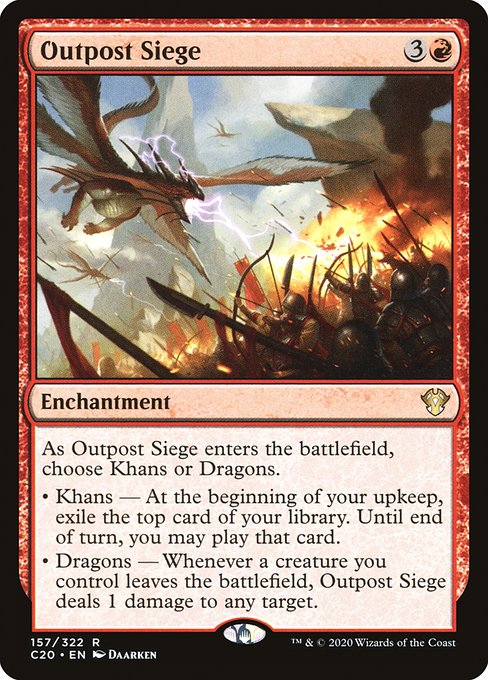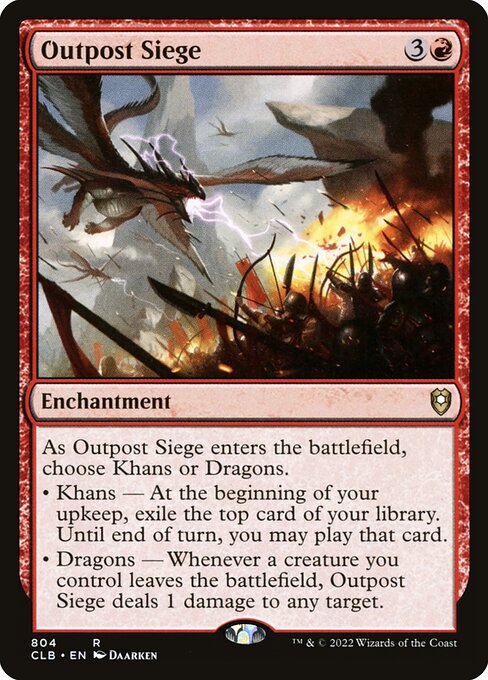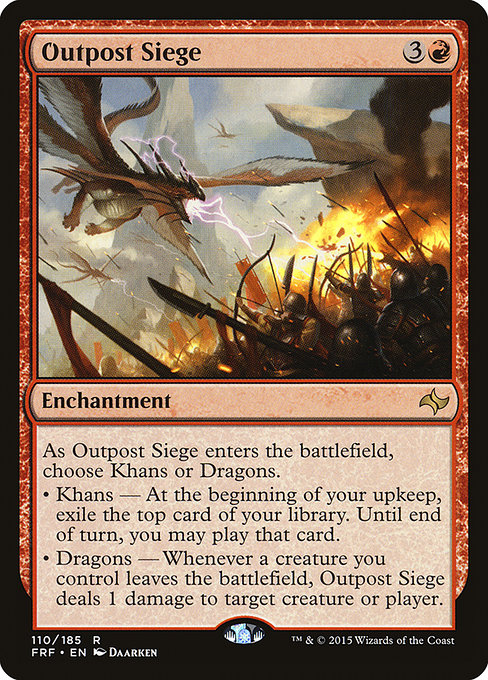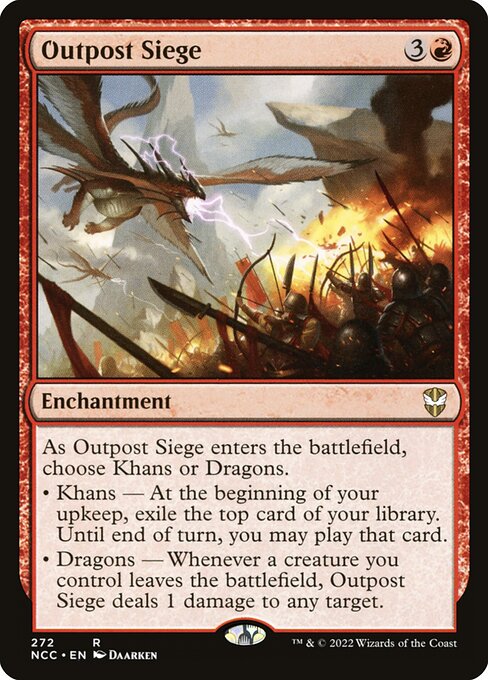Siège de l'avant-poste
Enchantement
Au moment où le Siège de l'avant-poste arrive sur le champ de bataille, choisissez Khans ou Dragons.
• Khans — Au début de votre entretien, exilez la carte du dessus de votre bibliothèque. Jusqu'à la fin du tour, vous pouvez jouer cette carte.
• Dragons — À chaque fois qu'une créature que vous contrôlez quitte le champ de bataille, le Siège de l'avant-poste inflige 1 blessure à une cible, créature ou joueur.
• Khans — Au début de votre entretien, exilez la carte du dessus de votre bibliothèque. Jusqu'à la fin du tour, vous pouvez jouer cette carte.
• Dragons — À chaque fois qu'une créature que vous contrôlez quitte le champ de bataille, le Siège de l'avant-poste inflige 1 blessure à une cible, créature ou joueur.
standard
future
historic
gladiator
pioneer
explorer
modern
legacy
pauper
vintage
penny
commander
brawl
alchemy
paupercommander
duel
oldschool
premodern
Rulings
If you exile a land card using the “Khans” ability, you may play that land only if you have any available land plays. Normally, this means you can play the land only if you haven't played a land yet that turn.
The card exiled by the “Khans” ability is exiled face up. Playing a card exiled with the “Khans” ability follows the normal rules for playing the card. You must pay its costs, and you must follow all applicable timing rules. For example, if it's a creature card, you can cast it only during your main phase while the stack is empty.
Each Siege will have one of the two listed abilities, depending on your choice as it enters the battlefield.
The words “Khans” and “Dragons” are anchor words, connecting your choice to the appropriate ability. Anchor words are a new rules concept. “[Anchor word] — [Ability]” means “As long as you chose [anchor word] as this permanent entered the battlefield, this permanent has [ability].” Notably, the anchor word “Dragons” has no connection to the creature type Dragon.
If a noncreature card is manifested and then leaves the battlefield while face down, the “Dragons” ability will trigger.
Each of the last two abilities is linked to the first ability. They each refer only to the choice made as a result of the first ability. If a permanent enters the battlefield as a copy of one of the Sieges, its controller will make a new choice for that Siege. Which ability the copy has won't depend on the choice made for the original permanent.
The card exiled by the “Khans” ability is exiled face up. Playing a card exiled with the “Khans” ability follows the normal rules for playing the card. You must pay its costs, and you must follow all applicable timing rules. For example, if it's a creature card, you can cast it only during your main phase while the stack is empty.
Each Siege will have one of the two listed abilities, depending on your choice as it enters the battlefield.
The words “Khans” and “Dragons” are anchor words, connecting your choice to the appropriate ability. Anchor words are a new rules concept. “[Anchor word] — [Ability]” means “As long as you chose [anchor word] as this permanent entered the battlefield, this permanent has [ability].” Notably, the anchor word “Dragons” has no connection to the creature type Dragon.
If a noncreature card is manifested and then leaves the battlefield while face down, the “Dragons” ability will trigger.
Each of the last two abilities is linked to the first ability. They each refer only to the choice made as a result of the first ability. If a permanent enters the battlefield as a copy of one of the Sieges, its controller will make a new choice for that Siege. Which ability the copy has won't depend on the choice made for the original permanent.
Rulings
If you exile a land card using the “Khans” ability, you may play that land only if you have any available land plays. Normally, this means you can play the land only if you haven't played a land yet that turn.
The card exiled by the “Khans” ability is exiled face up. Playing a card exiled with the “Khans” ability follows the normal rules for playing the card. You must pay its costs, and you must follow all applicable timing rules. For example, if it's a creature card, you can cast it only during your main phase while the stack is empty.
Each Siege will have one of the two listed abilities, depending on your choice as it enters the battlefield.
The words “Khans” and “Dragons” are anchor words, connecting your choice to the appropriate ability. Anchor words are a new rules concept. “[Anchor word] — [Ability]” means “As long as you chose [anchor word] as this permanent entered the battlefield, this permanent has [ability].” Notably, the anchor word “Dragons” has no connection to the creature type Dragon.
If a noncreature card is manifested and then leaves the battlefield while face down, the “Dragons” ability will trigger.
Each of the last two abilities is linked to the first ability. They each refer only to the choice made as a result of the first ability. If a permanent enters the battlefield as a copy of one of the Sieges, its controller will make a new choice for that Siege. Which ability the copy has won't depend on the choice made for the original permanent.
The card exiled by the “Khans” ability is exiled face up. Playing a card exiled with the “Khans” ability follows the normal rules for playing the card. You must pay its costs, and you must follow all applicable timing rules. For example, if it's a creature card, you can cast it only during your main phase while the stack is empty.
Each Siege will have one of the two listed abilities, depending on your choice as it enters the battlefield.
The words “Khans” and “Dragons” are anchor words, connecting your choice to the appropriate ability. Anchor words are a new rules concept. “[Anchor word] — [Ability]” means “As long as you chose [anchor word] as this permanent entered the battlefield, this permanent has [ability].” Notably, the anchor word “Dragons” has no connection to the creature type Dragon.
If a noncreature card is manifested and then leaves the battlefield while face down, the “Dragons” ability will trigger.
Each of the last two abilities is linked to the first ability. They each refer only to the choice made as a result of the first ability. If a permanent enters the battlefield as a copy of one of the Sieges, its controller will make a new choice for that Siege. Which ability the copy has won't depend on the choice made for the original permanent.
Votre collection ? vos decks ?
Envie de gérer votre collection et/ou créer des decks ?
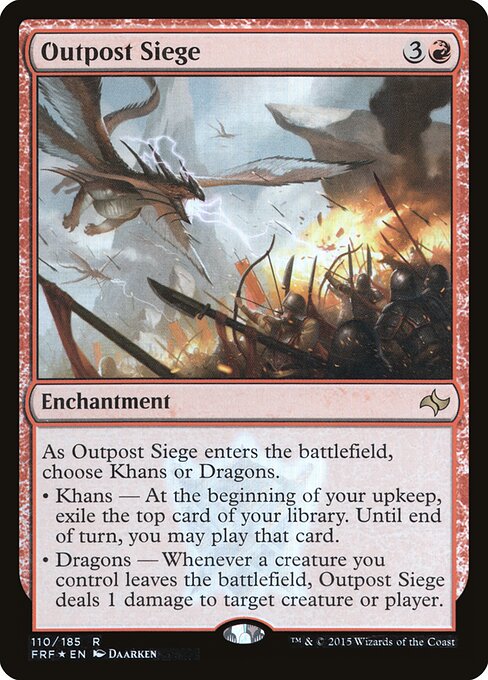

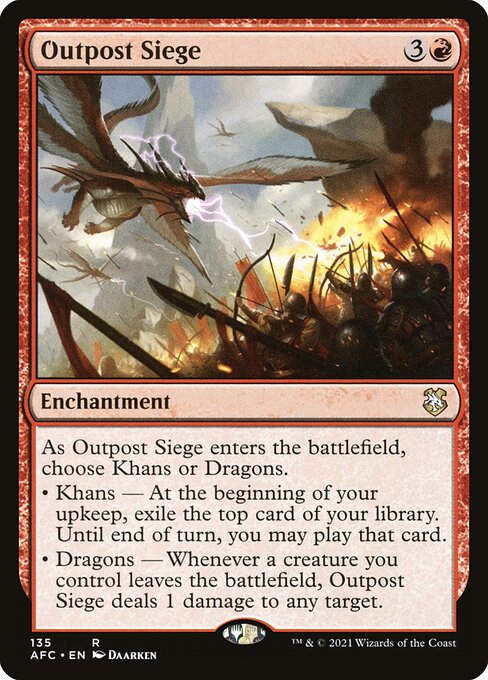
 0
0
 0.24€
0.24€
